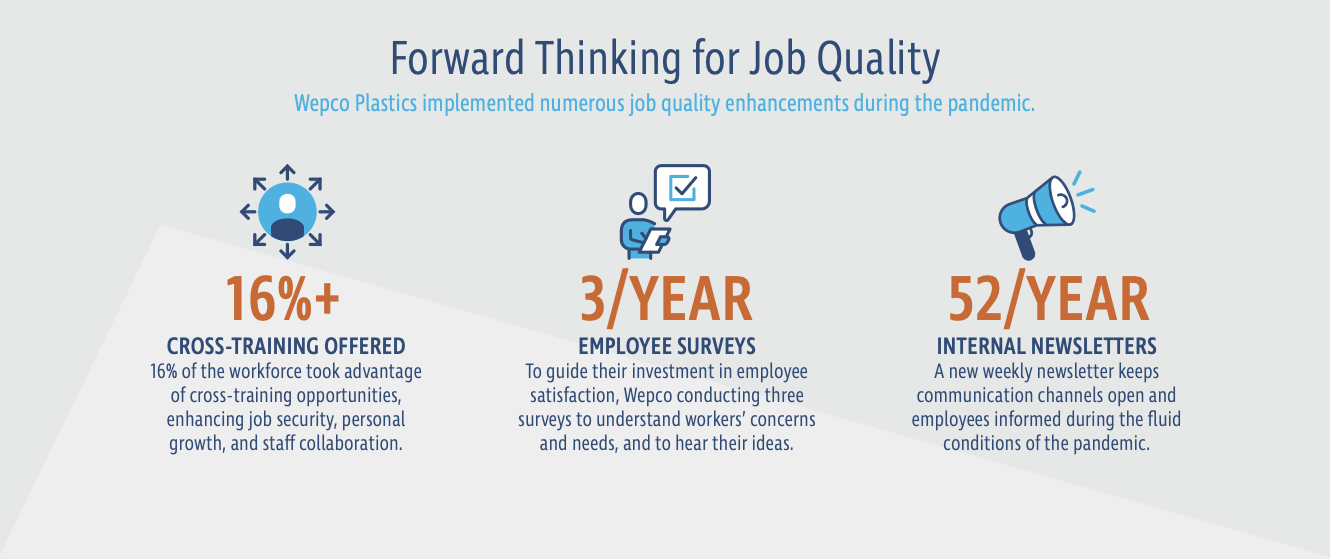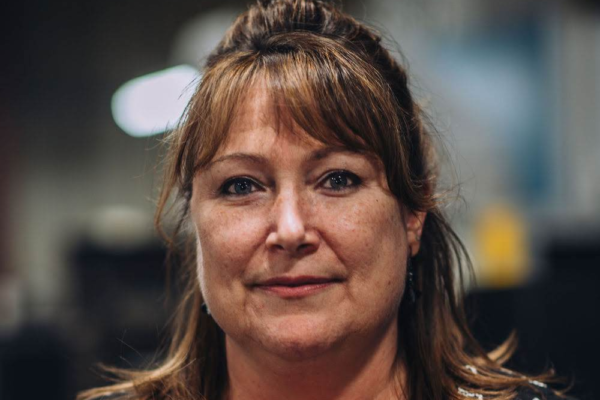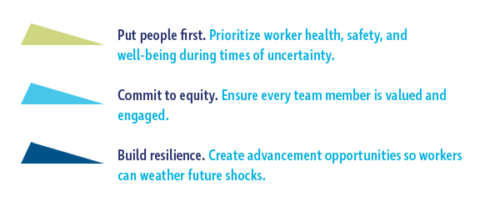Wepco Plastics
Creating a Path Toward Advancement
This profile is part of the Frontline Forward series. Frontline Forward recognizes employers whose good jobs practices have protected, supported, and developed frontline workers throughout the coronavirus pandemic. The key job quality practices and policies that are highlighted throughout the profile are drawn from the National Fund’s Job Design Framework. Designing quality jobs is good for workers, businesses, and their communities.
Noah O’Connor was working as a part-time shift leader at a restaurant when the COVID-19 pandemic hit Connecticut. He was in search of greater job stability and better compensation, when a friend working at Wepco Plastics told him the company needed help. The company was bringing on extra staff to make half a million plastic face shields for essential workers at Yale New Haven Hospital and the state Department of Corrections.
“This job was much better pay,” said O’Connor, who had recently graduated from high school. Wepco trained him to run its assembly line and kept him on as a shift leader once the face shields were no longer needed.
“Before this, I had no knowledge of manufacturing,” he said.

More than a job — skills and the ability to grow
Jessica Rivera likewise joined Wepco to help make face shields during the pandemic and found herself on a new career path once the orders were fulfilled. She was trained as a manufacturing support manager — and learned all the skills that come with that — so she could fill in for someone on maternity leave. When that person returned, the company offered her a position in sales and marketing, for which she is now in training.
“I was very pleasantly surprised that my managers at Wepco really made an effort to acknowledge when I was doing good work and provided opportunities to grow even more, and quickly, too,” she said.
O’Connor and Rivera joined Wepco just as the family-owned, plastic injection molding company was making a greater effort to focus on career development, including cross-training and advancement.
“It used to be that people stayed in the same position here for 10 or 15 years,” said Amanda Wiriya, Wepco’s manufacturing support manager. “Now we try to make sure we offer every person training. We pay them more and create a career path instead of just a job. We want to provide quality of life for everyone who works here. We want everybody making a livable wage at a skilled position.”
 |
– Jessica Rivera, Manufacturing Support Manager |
Listening to frontline workers improves business operations
Lorraine Miles was one of those who worked in the same role for more than a decade. Now she is being trained as a technician, a job that comes with higher pay. Miles appreciates the new attitude toward advancement, as well as the company’s willingness to listen to workers’ ideas – such as her suggestion that they cross-train machine operators.
Miles said she raised the issue because whenever she had to miss a day of work, nobody knew how to stand in for her. Now everyone learns how to clean and fix their own machines as well as run them – a practice that proved useful when the pandemic hit, and the company turned to longer shifts with fewer people in order to limit exposure.
“There were only two operators per shift,” Miles said. “There really wasn’t an extra person. Now we could take care of our own machines instead of calling a shift leader over to help.”
Really listening to workers, offering more training, and improving relationships between workers and supervisors are practices that emerged from employee surveys the company began developing under a 2017 National Fund grant to the Workforce Solutions Collaborative of Metro Hartford, the National Fund’s local partner.
“There really wasn’t an extra person. [After managers took my idea to cross-train machine operators] we could take care of our own machines instead of calling a shift leader over to help.”
– Lorraine Miles, Technician |
 |
Co-creating workplace safety in a pandemic
They’ve been rolling out surveys every few months since then, Wiriya said, including one that focused on worker safety during the pandemic. The surveys are part of an effort to improve open communication and included launching a company newsletter. This, too, proved useful once the pandemic hit, Wiriya said, allowing Wepco to better share breaking news and information with employees “because we had already opened an avenue of communication.”
Wepco also adjusted the shift schedules and production space to support and protect workers during the pandemic. They reduced the number of people on each shift from 31 to 5, lengthened shifts from 10 to 12 hours and created a 30-minute “room rest” window between shifts. They also created signage on the shop floor to control the flow of traffic and help maintain social distancing. They called this the “yellow-brick road.”
“Everybody had their own work station set up with supplies,” Rivera said. “We were required to wipe down stations before and after we started. They also put up plastic walls to divide the shop in back from the front office. They had everyone in the shop use the men’s bathroom because it was closer, and those in the office used the women’s restroom because that was closer to their end.”
Respect + recognition = resilience
Now that pandemic restrictions are starting to ease, the company has resumed weekly “all hands” meetings during which they share company metrics and create space for workers to raise any concerns they may have. That goes a long way toward making workers feel respected, O’Connor said.
“It makes everyone feel heard that way. It’s a safe space.”
About Frontline Forward
With Frontline Forward, the National Fund for Workforce Solutions recognizes employers whose good jobs practices have protected, supported, and developed frontline workers throughout the pandemic and beyond. These businesses have made the workplace safer and provided compassion, support, and flexibility to families during this time of illness and uncertainty. They offer advancement opportunities, so workers are more resilient to future shocks. Most importantly, they’ve created a workplace culture that ensures every team member is valued and given the chance to take part in their own — as well as the company’s – success.
The Frontline Forward Principles
Frontline Forward is made possible through a generous investment from Walmart to engage service sector employers to improve the quality of their jobs.




